Hugh Ross / Reasons To Believe Collection (9 vols.)
Digital Logos Edition
Overview
Both science and theology have much to say about the beginnings and the meaning of life, but the scarcity of helpful and productive dialogue has been overwhelmed by fierce rhetoric and ardently defended positions. When did life begin? Did life arise by chance? Does the universe display evidence of order? Philosophers, theologians, and scientists rarely agree, leaving many of life’s fundamental questions unanswered and inquiring minds bewildered.
Hugh Ross, who directs the efforts of Reasons To Believe, rises above the fray to present clear and well-reasoned arguments for the existence of God and evidence of God’s design in the universe. Drawing from his experience as a scientist and his background as a Christian apologist, Ross weighs in on the controversy; and confronts naturalist notions of creation and order.
In the 9-volume Hugh Ross/Reasons To Believe Collection, Ross shows that abundant evidence exists for a Creator, and that Christians who dispute naturalist claims about origins stand on firm intellectual footing. The books in the Hugh Ross/Reasons to Believe Collection address the most pressing issues relating to the current debate between creation and evolution, such as the evidence of order and design in the universe, the veracity and historicity of the events in Genesis, the origins of life, and the scientific basis for belief in God.
The Hugh Ross/Reasons to Believe Collection is ideal for anyone interested in the creation/evolution debate, for apologists, for Christians interested in science, and for pastors and teachers.

- Illustrations and graphics
- General and topical indexes included for quick reference
- The key issues in the creation/evolution debate
- The most insightful writing from the director of Reasons to Believe
Reasons to Believe is a nonprofit organization, without denominational affiliation, adhering to the doctrinal statements of the National Association of Evangelicals and the International Council on Biblical Inerrancy. It provides research and teaching on the harmony of God’s revelation in the words of the Bible and in the facts of nature.
- Title: Hugh Ross/Reasons to Believe Collection
- Author: Hugh Ross
- Publisher: Navpress.
- Volumes: 9
- Pages: 2,448
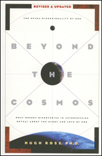
Beyond the Cosmos
- Publisher: Navpress
- Publication Date: 1999
- Pages: 265
How can my choices be totally free if God is in control of all things at all times and knows the end from the beginning? How can God hear my words and thoughts while listening to billions of others around the world at exactly the same moment? How can God be all-powerful and all-loving and yet allow so much suffering and evil?
These are complex paradoxes with far-reaching implications that have troubled people for centuries, testing the faith of those who believe in the biblical, personal God, and proving a stumbling block to those who do not.
But phenomena that seem impossible in the four-dimensional world we know (the three dimensions of space, plus the dimension of time) can become comprehensible when examined in the context of extra dimensions. Recent scientific discoveries have established that the equivalent of at least eleven dimensions exist. What are the implications of a personal God who can operate in and beyond such a realm?
The Bible is unique among the sacred writings of the world’s great religions, describing God as existing beyond the reaches of time and space as we know them. In this ground-breaking book, Dr. Hugh Ross examines scientific evidence that confirms the Bible’s declaration about God’s role in creation and may help explain some of the greatest paradoxes of the Christian faith.
Drawing on biblical teaching and scientific evidence that supports it, Dr. Ross invites us to know and experience God in a way we have never done before. As a result, our love and appreciation of him will be dramatically deepened, and the way we relate to him and to others—both believers and nonbelievers—will be changed forever.
Beyond the Cosmos brings the reality of God more fully before our minds and helps us love him with our whole being. We cannot love or believe a blank, but many parts of God’s revelation of himself and his world remain little more than a blank until qualified and gifted teachers lead us to greater clarity. Hugh Ross does that, giving the most difficult ideas in Christian teachings gripping new relevance to the realities of time and eternity.
—Dallas Willard, professor of philosophy, University of Southern California
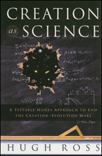
Creation as Science
- Publisher: Navpress
- Publication Date: 2006
- Pages: 295
Who or what shaped the cosmos and life? In the heated battle over evolution, creation, and intelligent design, all sides have become deeply entrenched. Dialogue has vanished amid the smoke and shrapnel.
Astronomer and author Hugh Ross leaps into the fray with a unique approach—one that brings real hope for progress in pursuit of the truth. In Creation as Science he proposes that any account (or model) of how the universe, life, and humans came to be deserves serious consideration if and only if it is verifiable/falsifiable. A valid model must stand or fall by the scientific method. It must address the why questions and successfully predict what ongoing research will reveal.
This book introduces one such model, the Reasons to Believe (RTB) Creation Model. While many voices argue that creation is a strictly religious notion, Ross demonstrates that it can also be a scientific one. His model incorporates what the latest research says—in striking harmony with the Bible—about:
- The origin and expansion of the universe
- What life demands of a galaxy, star, and planet
- How and when life formed
- How changes in the sun impacted the fossil record
- The emergence and sustenance of humanity and civilization
Ross concludes with a stunning assertion: Scientists’ willingness to consider creation as a testable possibility can boost scientific advance and spark a resurgence of interest in the scientific enterprise.
This is the most scientifically compelling compilation I have ever read that demonstrates the work of a purposeful Creator in founding the universe, Earth, and life. Through page after page of precisely cited mainstream research studies from the world’s most highly recognized scientific journals, Ross demonstrates the fine-tuning that was required to prepare the universe and Earth for human life. If scientists would read this book, they’d be confronted with overwhelming evidence from astronomy, biology, and chemistry that would likely shake their preconceptions and change the way they teach.
—James M. Tour, Ph.D., professor of chemistry, Rice University
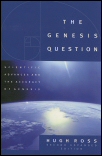
"Everyone knows the Bible teaches scientific nonsense" is a commonly held misconception. When pushed for examples, many point to the early chapters of Genesis as proof—creation, the Flood, 900-year life spans. And science has largely been silent on the subject—until now.
Examining recent, leading-edge scientific discoveries, Dr. Hugh Ross explores how these very chapters hold some of the strongest scientific evidence for the Bible’s supernatural accuracy. Like never before, The Genesis Question integrates the accuracy of both science and the Bible—without compromise—giving skeptics and believers common ground and opportunity for dialogue.
Dr. Ross intriguingly challenges the long-standing divide between faith and reason and between the Bible and science by addressing the relevant, cutting-edge questions of our day. Expect to find your mind challenged, your faith encouraged, and your ability to witness strengthened by this book.
—Craig S. Keener, Th.D., visiting professor of Bible, Eastern Seminary, and author of the IVP Bible Background Commentary and the volume on Matthew in the IVP New Testament Commentary.
The importance of The Genesis Question lies in its painstaking attempt to take the details of Genesis and science seriously. Even if the reader does not agree with every one of Ross’s conclusions, one must thank him for this solid effort at integration, and for giving us a number of ideas that seem to me to be true, reasonable, and fruitful for spiritual nurture and evangelism.
—J. P. Moreland, Ph.D., professor of philosophy, Talbot School of Theology, Biola University
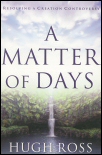
Creation—it’s all in six days’ work. But did the creation days of Genesis last hours or epochs?
The length of time represented by the word day sparks a storm of controversy. Lightning strikes and thunder roars with questions at the core of this debate:
- Does belief in an old earth equate to belief in evolution?
- Was there any kind of death before the Fall?
- Does the Bible speak of a “big bang”?
- Is God’s plan a restored paradise or a whole new creation?
In A Matter of Days, respected author and astronomer Hugh Ross, Ph.D., addresses these questions and explores how the creation-day controversy developed. History, theology, science, and Scripture reveal creation’s big picture.
Hugh Ross’s spiritual depth and brilliance of mind is the rarest of blends. He addresses the topic of Creation, opening many thoughtful minds and hearts to the message of salvation, providing them new reasons to believe.
— Dr Jack W. Hayford, founder and chancellor of The King’s College and Seminary
Three decades ago, when I was still an atheist, a work like this one could have satisfied my own objections to Genesis. This book should help many Christians to stop fighting about how God created and get back to our business of proclaiming that he did it.
—Craig S. Keener, Th.D., visiting professor of Bible, Eastern Seminary, and author of the IVP Bible Background Commentary and the volume on Matthew in the IVP New Testament Commentary.
Hugh masterfully explains how it is entirely plausible that a day on earth might be one thing, a solar day another, and a day in the universe another entity altogether. I congratulate Hugh on his work. A Matter of Days deserves a careful reading.
—Pat Robertson, chairman and CEO of The Christian Broadcasting Network, Inc., and host of The 700 Club.
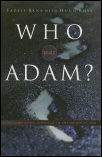
Was Adam an accident of nature or a deliberative, purposeful design?
While observations seem to validate evolutionary theory, long before Darwin, a man named David voiced a different view. And both men can’t be right.
Cutting-edge research presents new findings on:
- The hominid fossil record
- Junk DNA
- Neanderthals
- Human and chimp genetic similarity
Biochemist Fazale Rana and astronomer Hugh Ross discuss these discoveries and propose a new scientifically testable model for human origins. Can human evolution be declared a fact? Or does creation make more scientific sense?
This is a scholarly, in-depth scientific treatment of the origin of human beings from an old-earth creationist point of view that is based on a belief in the historicity and reliability of the Genesis record.
—Dr. Norman Geisler, dean, Southern Evangelical Seminary, and lecturer at the Logos Lecture Series on June 27, 2008.
Fazale Rana and Hugh Ross have produced a creation model on the origin of man that is at once as comprehensive in its data-gathering as it is challenging in the depth of its detail. Readers, regardless of their perspective on the matter of human origins, will be impressed with the fairness, balanced, and scope of the arguments. Who Was Adam takes the creationist/evolutionist debate to a whole new level but insists on grounding the debate in the new evidences from genetics, biochemistry, archaeology, geology, and even astrophysics and the biblical narrative of creation.
—Walter C. Kaiser, Jr., president, Gordon-Conwell Theological Seminary; Colman M. Mockler Distinguished Professor of Old Testament
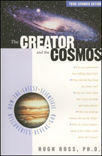
The Creator and the Cosmos
- Publisher: Navpress
- Publication Date: 2001
- Pages: 267
Few of us can venture outside on a clear, dark night and not pause for a silent, reflective look at the stars. For countless centuries, people have felt a sense of wonder about the heavens. How did our universe come into being? Has it always been here? Is our existence due to random chance or supernatural design? Is God out there? If so, what is he like?
Traditionally, the church has answered such questions with Scripture, while science has contributed theories and formulas of its own. Torn between a deep respect for church doctrines and an intellectual need for answers that support what their senses are telling them, many Christians have avoided such discussions altogether.
Actually, the two sides are no longer that far apart. In The Creator and the Cosmos, astronomer Hugh Ross explains how recent scientific measurements of the universe have clearly pointed to the existence of God. Whether you’re looking for scientific support for your faith or new reasons to believe, The Creator and the Cosmos will enable you to see the Creator for yourself.
A compelling summary of scientific evidence that supports belief in God and the Word of God, written on a level even the non-technically trained layperson can understand.
—Walter L. Bradley, professor and head of the Department of Mechanical Engineering, Texas A&M University.
In The Creator and the Cosmos, Dr. Hugh Ross shows how recent cosmological discoveries clearly indicate the universe was created with many characteristics fine-tuned for our life. Though many scientists may resist the logical conclusion, the Creator implied by the scientific evidence is exactly consistent with the God revealed in the Bible.
—Dr. Kyle M. Cudworth, Yerkes Observatory, University of Chicago
The Creator and the Cosmos constitutes a remarkable journey through the most recent scientific findings, providing overwhelming support for design in our universe. Dr. Ross has documented the evidence for design in our universe in such a thorough, yet readable, style that it will prove to be of great value both to the science student as well as to the interested layperson.
—Dr. David H. Rogstad, physicist, Caltech Jet Propulsion Laboratory.
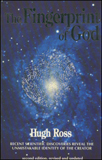
The Fingerprint of God
- Publisher: Navpress
- Publication Date: 2001
- Pages: 239
How can we know whether or not God exists? For the last few centuries most scientists have promoted an atheistic or agnostic reply. In the last decade, however, a set of remarkable discoveries about the universe have dramatically jolted their position. Have cosmologists been forced to acknowledge the existence of God? If so, how?
Historically, the question “How did the universe begin?” has evoked chauvinistic replies from opposing camps:
- Scientists have said that there may be an answer, but it only will come through a study of science.
- Theologians have said that there may be an answer, but it will only come through a study of theology.
- Philosophers have concluded that there is no answer. Existentialists go so far as to declare that the question itself is absurd.
To tell the story of how the question has been answered—independently and corroboratively, by both science and theology—is the purpose of this book. In The Fingerprint of God Dr. Hugh Ross tells the fascinating story of how the latest research into origins not only has sealed the case for divine creation, but has revealed the identity of the Creator himself.
No publication brings research findings to the lay reader more clearly and convincingly than does this one by Dr. Ross. The reader will find it gripping in its significance for the Christian faith.
—C. Davis Weyerhaeuser
Here we have a powerful new tool for convincing skeptical minds of the credible and compelling basis for personal faith in Jesus Christ.
—Dr. Bill Bright, president and founder, Campus Crusade for Christ
…an impressive integration of material from many different perspectives—philosophical, scientific, and religious. You don’t have to be an expert to read it, but you won’t be disappointed if you are one.
—Dr. Earl Radmacher, president, Western Conservative Baptist Seminary
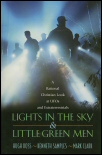
Across the spectrum of humankind there are beliefs and theories about UFOs and extraterrestrial life as diverse and numerous as the stars in the sky. Primarily, a dichotomy exists between naturalists who deny the supernatural and insist upon scientific explanations for all accounts, and mystics who attribute every unusual sighting to paranormal activity.
People everywhere are looking for honest answers. As believers, we neither shy away from the supernatural because it is unsettling nor condemn scientific explanations for their lack of spirituality. Rather, we search for truth.
In Lights in the Sky and Little Green Men, the authors have initiated a search for truth to answers about UFO sightings and extraterrestrial life. Using extensive scientific background and knowledge of the Scriptures, they approach these questions:
- Could life exist on other planets?
- Does documentation exist for UFO sightings and landings?
- What has been the government’s involvement in UFO and extraterrestrial phenomena?.
- Is there a relationship between UFO sightings and demonology?
- How should believers approach the subject of UFOs and extraterrestrial life?
When we have questions about UFO and extraterrestrial phenomena, we should seek answers from qualified sources. Authors Hugh Ross, Kenneth Samples, and Mark Clark have training and experience in the appropriate disciplines. They augment scientific and historical analysis with truths from God’s Word to provide a balanced look at a controversial subject.
Hugh Ross earned a B.Sc. in physics from the University of British Columbia and an M.Sc. and Ph.D. in astronomy from the University of Toronto. He directs the efforts of Reasons to Believe.
Kenneth Samples holds undergraduate degrees in philosophy and social science and a master’s degree in theological studies. He is currently vice-president of Philosophical and Theological Apologetics at Reasons to Believe and an adjunct instructor of philosophy and religion. Kenneth is also the founder and president of the Augustine Institute, a nonprofit educational center for philosophical and religious studies.
Mark Clark received his Ph.D. in international relations from the University of Southern California. He is a professor of political science, and the chair of that department, as well as the director of the National Security Studies program at California State University, San Bernardino. Mark is an adjunct fellow at the Claremont Institute and a consultant to TRW on strategic nuclear forces.
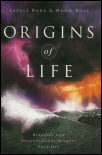
The first life: What did it look like? When did it appear? How did it get here?
Imagine primordial earth, a churning cauldron of liquefied rock. Steaming, seething—a vast desolate wasteland, inhospitable to life. Yet somehow first life appeared. Maybe chemicals in a primordial soup spontaneously spawned a single-celled creature that continued to evolve.
To determine what really happened requires a framework to evaluate the evidence. For the first time in print, Dr. Rana and Dr. Ross present a scientific model for the creation of the first life on Earth—a model based on the Bible. They present testable predictions for this life-origins scenario and for the competing naturalistic scenarios. Which model withstands the rigorous scrutiny of science and the tests of time? The one that does give insight to a deeper question: Why would the first life forms precede human life by billions of years?
Praise for the Print Edition
Fazale Rana and Hugh Ross have provided a thorough and devastating analysis of all naturalistic attempts to explain the origin of life.
—Phillip E. Johnson, author, Darwin on Trial
Fazale Rana and Hugh Ross’s critique of materialistic theories for the origin of life is so thorough and balanced that one wonders if materialists might be holding on to their Swiss-cheese hypotheses for reasons other than scientific ones.
—Michael J. Behe, professor of biological science, Lehigh University, Bethlehem, Pennsylvania
Hugh Ross earned a B.Sc. in physics from the University of British Columbia and an M.Sc. and Ph.D. in astronomy from the University of Toronto. For several years he continued his research on quasars and galaxies as a post-doctoral fellow at the California Institute of Technology. For eleven years he served as minister of evangelism at Sierra Madre Congregational Church. Today he directs the efforts of Reasons to Believe, an institute founded to research and proclaim the factual basis for faith in God and his Word, the Bible. He also hosts a weekly television program called “Reasons to Believe” on the Trinity Broadcasting Network and a weekly live call-in radio program on several stations throughout the United States. Over the years, Dr. Ross has given hundreds of lectures, seminars, and courses, both in the United States and abroad, on Christian apologetics. He lives in southern California with his wife, Kathy, and sons, Joel and David.
Reviews
4 ratings

Mark Spencer
7/3/2018
Reasonable, consistent and useful in reaching a secularly scientific world with eternal spiritual truth.Brian Huffling
3/8/2017
"Total value if sold separately: $96.82 Your exclusive price: $99.95" Ummmmmm . . . ???
Matthew Gunn
1/1/2015

Paul Boone
8/10/2013